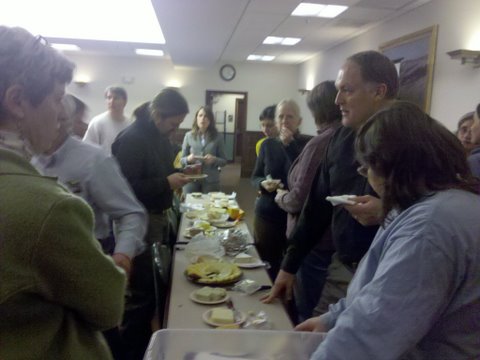Three Shepherds Farm is proud to announce another advanced cheesemaking class will take place from November 6-8, 2009 at the beautiful Longfellow’s Creamery in Avon, Maine. Committed to organic, sustainable agriculture, Longfellow’s Creamery produces a variety of amazing products, including the highest quality raw milk and delicious cheeses.
At the Three Shepherds advanced cheesemaking class, the basic principals of cheesemaking will be elevated to the next level. This class is designed for anyone who has a serious interest in cheesemaking and has either taken the Three Shepherds Farmstead Artisanal Cheesemaking Course or those who have the equivalent amount of experience from other classes and/or their own cheesemaking.
Over the three-day class, Dr. Larry and Linda Faillace will incorporate a variety of complex cheese recipes, including those for mold ripened cheeses, blue cheeses, soft and semi-hard washed rind cheeses, Pyrenees Mountain style hard cheeses, and several pasta filata cheeses. The class will emphasize the amazing transformations that take place during aging, the mysterious part of the cheesemaking process which truly allows for milk’s “leap into immortality.”
In addition to experimenting with new styles of cheesemaking and discovering the art of aging, cheesemakers will to learn the key elements necessary make a truly great product, as well as problems that can be encountered during the cheesemaking process and how those common pitfalls can be avoided. We encourage students to bring samples of their own cheeses for evaluation by the instructors and other students. This is a very valuable opportunity to get positive feedback on your cheeses and learn how you can make them even better.
Throughout the weekend, there will be sampling of a wide variety of cheeses, including some of the world’s best examples of those that we make during the class. Also, we will incorporate some delicious culinary uses of a variety of cheeses that have great commercial value for your cheese operation (and are great crowd pleasers for your friends and family too!
We look forward to seeing you in Maine in November. The class is limited in size and is already filling quickly so please call Larry or Linda at Three Shepherds Farm at 802-496-3998 for registration or more details.
Linda Faillace, author of Mad Sheep from Chelsea Green Publishing
Dr. Larry and Linda Faillace
Three Shepherds of the Mad River Valley
108 Roxbury Mountain Road
Warren, VT 05674
Tel: 802-496-3998
www.threeshepherdscheese.com
